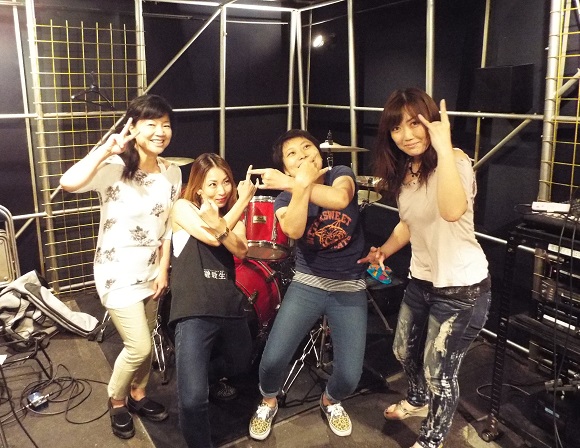
When people think of Japanese music, their thoughts usually turn to J-pop or BABYMETAL–and while nothing is wrong with that, there’s a lot more to be found! We’ve been exploring some of our favorite music in Japan over the last few months, but there’s still a massive universe of artists left to discover. Today, we’ll be breaking out the jackhammer and drilling deep into the world of underground Japanese metal, specifically grindcore and the internationally acclaimed (but still largely unknown) band Flagitious Idiosyncrasy In The Dilapidation.
From overseas touring to being a woman-only band in a male-dominated scene, this interview is sure to keep even Top 40-loving readers interested.
Grindcore, in case you’re not familiar with the term, is just about as brutal (a compliment, in this case) as you can get. A cross between the most extreme subgenres of metal and punk, the guitars, bass, and drums are generally fast, distorted, and heavier than an out-of-control steamroller. The vocals, of course, fit right in, being screamed, growled, and shrieked at maximum intensity, with lyrics about everything from veganism to mutilating corpses.
Basically, it’s the kind of music that your parents probably told you was a gateway to satanism and blood rituals.
▼We can kind of understand why they might have thought that…
While Flagitious Idiosyncrasy In The Dilapidation has never sacrificed any goats (to the best of my knowledge), there’s no doubt that when it comes to aggressive and brutal, the band knows what they’re doing. Which should hardly be a surprise, since they’ve been playing together for over ten years. “We probably played our first show in 2003,” Makiko, the vocalist, said after a bit of consultation with her bandmates.
But despite the long life of the band, this wasn’t the first gig for any of them. “We were all in different bands at the time,” Kanako, the bassist, explained, “but for each of us, we were the only woman in our bands.”
The idea to start an all-woman grindcore band was originally floated by an ex-guitarist. Makiko added that it was never meant to have a feminist message or be a gimmick. Tomoko, the drummer and mother of two, explained that they all had no problem playing in bands with men, but it could get a bit lonely.
▼Kanako, bass
So, what was it like being the only woman in a scene filled primarily with men?
Generally, it seems there’s no problem for any of the women in Flagitious Idiosyncrasy In The Dilapidation. Men in other bands have never given them a hard time, and, while some fans might add the insipid phrase “for women” after a compliment, Makiko told me that when it comes to stupid remarks, “I just laugh it off.”
Though they are best-known as an all-woman grindcore band, there have been a number of changes over the years. For example, before the current guitarist Noriko, who wasn’t able to attend the interview, an American man named Ben played guitar. In fact, they all agreed that being an “all-woman” band isn’t particularly important to them. Nevertheless, there was a general agreement that they felt a bit more comfortable playing in Flagitious Idiosyncrasy In The Dilapidation, if only because it meant none of them were ever the only woman in the room. And, honestly, I think that’s a feeling anyone can understand!
But this left me wondering, why aren’t there more women involved in the grindcore scene in Japan? Of course, this isn’t an entirely fair question–underground metal and punk scenes the world over suffer from a lack of diversity–but I wondered if Japan might be different.
▼Makiko, vocals
One of the first things that came up was that while there might not be many women in the audience, there are a lot more women on the stage than in other countries they’ve played. Based on their experiences, the three women agreed that there seem to be more women playing in grindcore bands in Japan than in other countries. Aside from Flagitious Idiosyncrasy In The Dilapidation, there are many other Japanese bands with female members, like Sete Star Sept, Kurupino, and Self Deconstruction.
“But when we go overseas, there are way more women in the audience,” Kanako said.
Since I haven’t been to a show outside of Japan in at least six years, I decided to ask Seattle-based metalhead and NoCleanSinging‘s editor-in-chief Islander if he agreed. His response was a qualified yes. “In the U.S. I would say the percentage of women in the average audience for extreme metal shows is higher than the average percentage of women you see on stage — both percentages are still in the minority, though I think they’ve both been steadily growing.”
So what are the barriers–if any–to joining the underground metal scene in Japan. Referencing What Are You Doing Here?, a book about the experiences of Laina Dawes, a black woman, in the largely white male metal and punk scenes of North America, I wondered if any of the three women experienced pushback or harassment.
▼Noriko, guitars
They all shook their heads. “I never really saw anything like that,” Makiko explained. It’s the image of grindcore and metal/punk in general that seems to be keeping women away. “It’s just not very fashionable or ‘cool!'” she laughed.
The three women thought that most Japanese high school girls, for example, aren’t going to be interested in the rough image of grindcore. “I came to it through visual kei,” Tomoko explained. “I started out playing in brass band in high school, but I got into the pretty, mainstream bands, like X Japan or Luna Sea. From there, I got obsessed and started digging deeper and deeper into the underground.”
Kanako had a similar story, though she said that she’d never played in a grindcore band before Flagitious Idiosyncrasy In The Dilapidation.
On the other hand, Makiko came to grindcore through the punk scene, which she got into through skater and punk friends in high school. “I was like an otaku,” she said, laughing at how she’d spent time searching for new music. The vocalist also told me that doing study abroad in Florida in the late 1990s helped her get into metal.
▼Tomoko, drums
This led me to wonder about the culture of the scene in general. As a band that has played shows overseas, how did they think the culture of the Japanese grindcore scene compares to that of other countries?
After a bit of discussion, the answer was: It’s basically the same.
Echoing a sentiment shared by many metalheads around the world, they explained that the basic culture doesn’t change that much from country to country. As Tomoko described it, there’s a sort of communication through the music, even if people aren’t speaking the same language. Kanako called it a “shared spirit,” adding that the people involved in the scene–whether in Japan or overseas–are all great people.
However, there was one big difference that Makiko pointed out in terms of audiences. When it comes to touring internationally, she said that they’re always impressed by how enthusiastic audiences are. “Even if they don’t know us, they really get into it! We always love playing for crowds where everyone just goes wild.” Japanese audiences, on the other hand, tend to be a bit more subdued. That’s not to say that Japanese audiences don’t get into it–you’ll rarely find a show without at least a few people moshing–but it seems that Japanese crowds generally prefer to stand back and listen.
There may be some differences in terms of performance–Kanako mentioned that in some places there was a bit more chaos backstage or that the staff may be more or less disorganized–but the members of Flagitious Idiosyncrasy In The Dilapidation said they’ve never had trouble with other bands around the world.
But despite having toured internationally, it’s nearly impossible to make a living playing grindcore and all four of the members have “real” jobs as well. While it might be tempting for some to brag about their band to anyone who will listen, it turns out the member of Flagitious Idiosyncrasy In The Dilapidation generally keep their musical lives to themselves. I wondered if they were worried about being treated differently due to the rough nature of their music, but it was nothing so drastic.
“My co-workers know I’m in a band, but they don’t know what kind of band,” Kanako told me before explaining that it was mostly because she figured no one would care. “If someone wanted to hear the music, of course I would let them, but I don’t think they’re interested.” That’s a lot more modesty that I could muster!
Tomoko, who splits her time between working, raising her children, and performing in Flagitious Idiosyncrasy In The Dilapidation, is basically in the same position. The drummer said that she usually only brings it up when she needs to take time off for a show.
▼Tomoko nearly beating the drums to pieces.
As for Makiko, she said that she’s kept her music career a secret at work–though again more for practical reasons than for concern that she’d be treated differently. “If they knew I were in a band, they’d just say, ‘Oh, for your music again?’ whenever I wanted to take a day off,” she laughed.
After over a decade performing and writing together, I wondered what was next for the band.
“We basically want to just keep doing what we’re doing,” Makiko said to the agreement of her bandmates. They’re currently signed to San Francisco-based Six Week Records, a label with an impressive roster of underground metal and punk bands that has been going since 1992, and have no plans of trying to jump to a major label.
While it would be difficult to imagine any of the big Japanese music comanies trying to market a grindcore band to the masses, I did wonder how they planned to approach distribution. One of my biggest complaints about the underground music scene in Japan is the resistance to digital distribution through services like Bandcamp or iTunes. Most Japanese artists seem to stick with CDs–even though, in my opinion, it limits their ability to reach potential fans. One reason, perhaps, is the desire among both fans and bands to have something physical. A lot of people still enjoy the experience of cracking open a new case and reading the lyrics.
▼We’re guessing that means no collaborations with AKB48 though…
“Partly, it’s because Japan is just a little bit behind the times,” Makiko said. She gave the example of MySpace and Facebook, saying that Japanese bands in general didn’t start using the services until a few years after they’d already been widely adopted overseas. Part of the reason that Flagitious Idiosyncrasy In The Dilapidation has music available digitally and an active Facebook page is their interaction with overseas bands and their US-based label.
As the interview wound down, I asked how they would explain the appeal of grindcore to non-fans, as I’m sure many of our readers are. “Listen to it when you’re really pissed off!” Kanako said, laughing. “It’s great music to really blow off steam.” Makiko added that the music is like a party–most pop songs play around 120 or 140 beats per minute, but grindcore is usually at 240 beats per minute, so there’s twice as much going on. “We just shove everything we want into a really small space! It’s like a party.” The vocalist also mentioned that people need to change how they think about singing. “If you come to grindcore wanting a singer, you’ll hate it,” she explained. “You have to think of the vocals as another instrument.”
Of course, the one downside to grindcore vocals is not being able to understand the lyrics. While many bands have political or gory themes, Flagitious Idiosyncrasy In The Dilapidation deals more with personal topics. “Politics can be really sensitive,” Makiko said, “and while I write the lyrics, that becomes the ‘message’ of the band. We don’t discuss politics, so I don’t want to put out a message not all of us might agree with.” But what about the horror-movie themes of other bands? “I just write what I think about–and I don’t think about killing people!” Instead, she focuses on the things that frustrate her throughout the day and writes lyrics expressing her thoughts.
Finally, I asked if they had any messages to share with our smart, sexy readers. “Metal and grindcore might not be very popular, but please give them a chance!” Kanako said. “And please come to our shows!” Tomoko chimed in. “If you’re thinking about starting a band, but not sure, just do it! It’s a lot of fun!” Makiko added.
I’d like to extend a huge thank you to all the member of Flagitious Idiosyncrasy In The Dilapidation for letting me photograph and record their practice and for taking the time to sit down and answer all my questions.
If you’re interested in seeing the band perform, you’ll have a few chances to see them outside of Japan this year and next. They’ll be playing the Sun Eaters Festival in South Korea on September 7 and the band has been confirmed for the Maryland Deathfest in 2015. Obviously, they also play around Japan as well, and you can find schedule information on their Facebook page. Their album Wallow is available on iTunes and CDs are available through Six Week Records or Big Cartel.
References: Facebook, Flagitious Idiosyncrasy In The Dilapidation
All photos by RocketNews24 unless otherwise noted

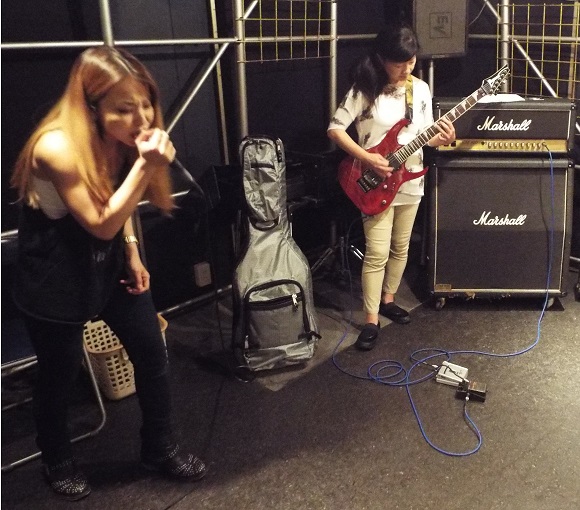
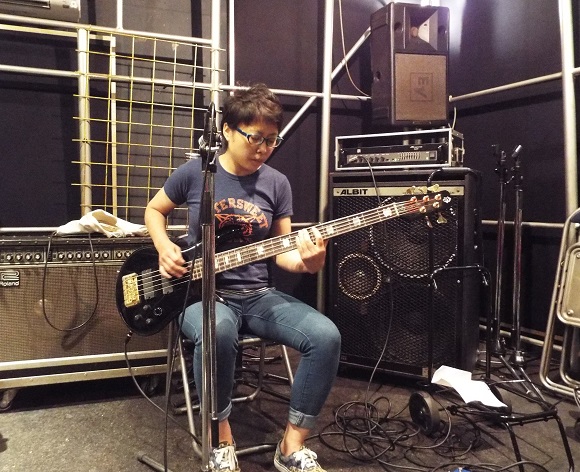
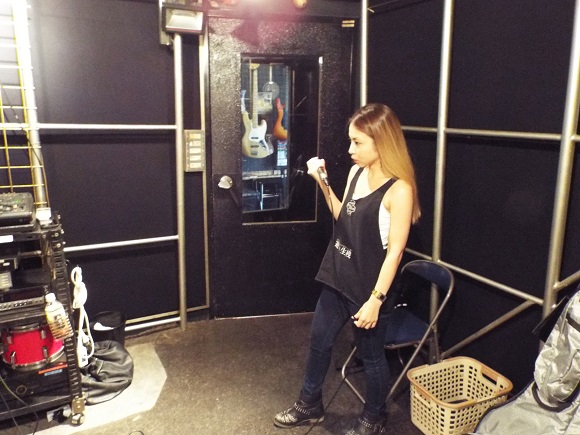
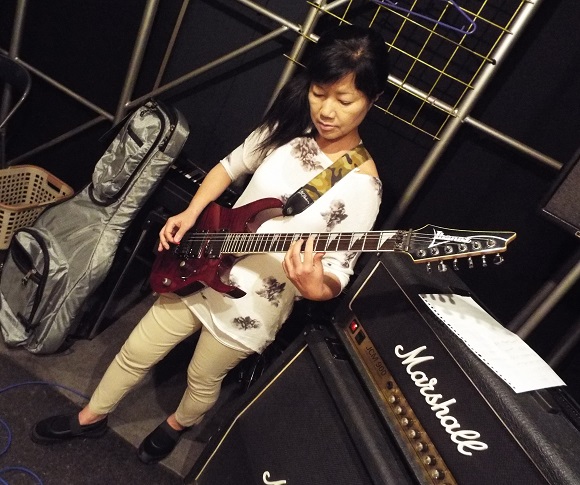
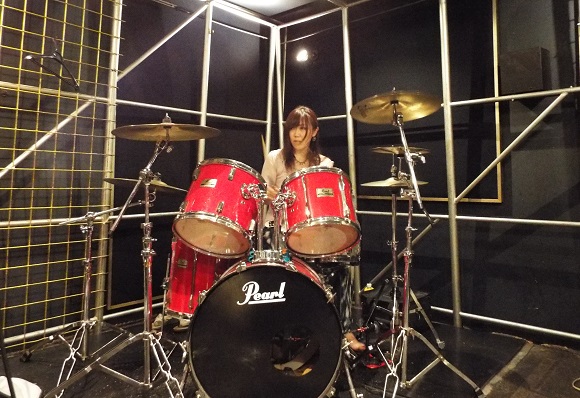
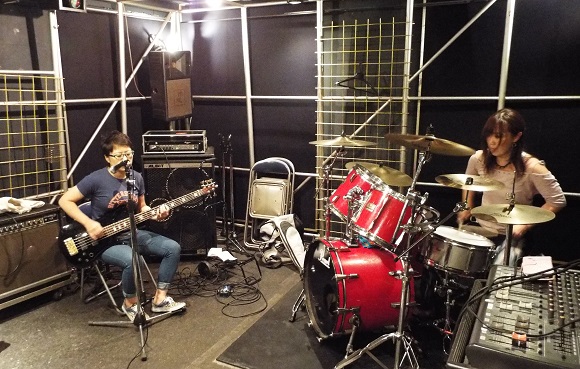
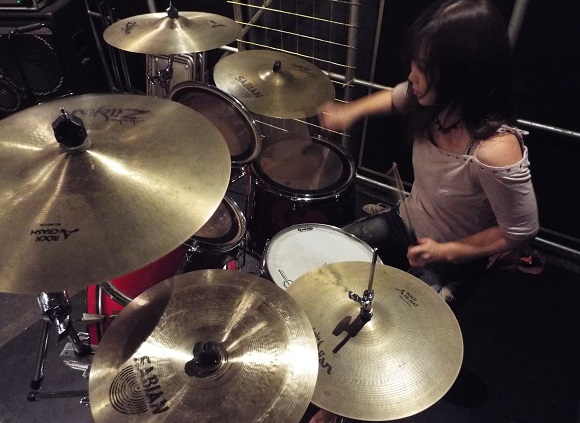
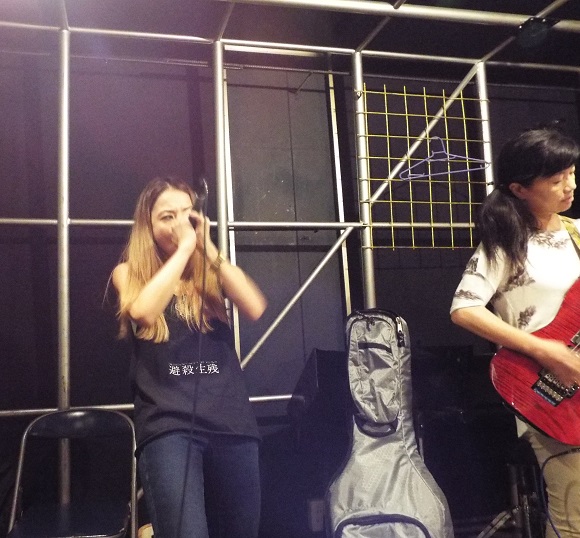
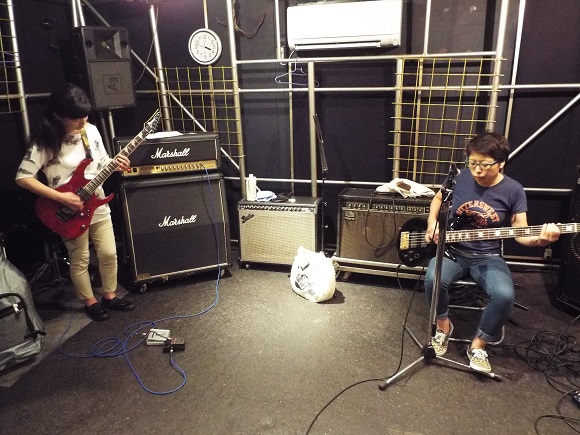
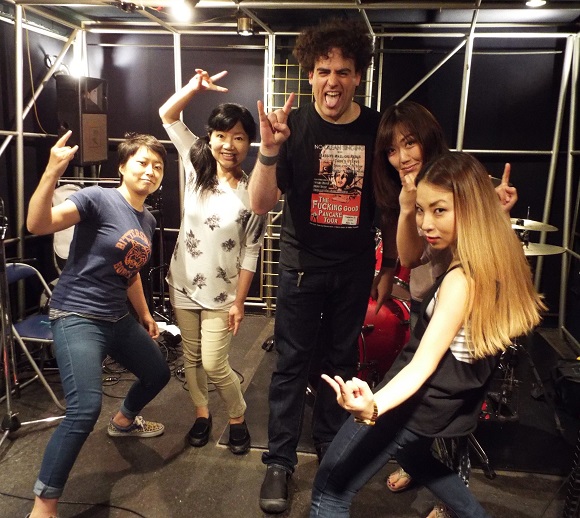
 Takarazuka, Japan’s all-woman theater troupe, is producing a musical about Abe Lincoln
Takarazuka, Japan’s all-woman theater troupe, is producing a musical about Abe Lincoln BABYMETAL releases full album, metalheads and idol fans headbang in unison
BABYMETAL releases full album, metalheads and idol fans headbang in unison Antinomy: Talking to Urbangarde about their vision, music, and lying to fans
Antinomy: Talking to Urbangarde about their vision, music, and lying to fans It’s a hard rock life: NINGEN ISU’s Shinji Wajima talks about songwriting, working with friends
It’s a hard rock life: NINGEN ISU’s Shinji Wajima talks about songwriting, working with friends Real-life high school from Kyoto Animation’s Sound! Euphonium wins gold medal at band competition
Real-life high school from Kyoto Animation’s Sound! Euphonium wins gold medal at band competition How to order snacks on a Shinkansen bullet train in Japan
How to order snacks on a Shinkansen bullet train in Japan Japan’s new difficult-to-drink-from beer glass protects your liver, but it’s a brutal experience
Japan’s new difficult-to-drink-from beer glass protects your liver, but it’s a brutal experience Demon Slayer: Kimetsu no Yaiba gets new roller coaster attractions and food at Universal Studios Japan
Demon Slayer: Kimetsu no Yaiba gets new roller coaster attractions and food at Universal Studios Japan Burger King Japan suddenly adds Dr. Pepper and Dr. Pepper floats to its menu nationwide
Burger King Japan suddenly adds Dr. Pepper and Dr. Pepper floats to its menu nationwide New Pokémon ice cream, dessert drinks, and cool merch coming to Baskin-Robbins Japan【Pics】
New Pokémon ice cream, dessert drinks, and cool merch coming to Baskin-Robbins Japan【Pics】 New Nintendo Lego kit is a beautiful piece of moving pixel art of Mario and Yoshi【Photos】
New Nintendo Lego kit is a beautiful piece of moving pixel art of Mario and Yoshi【Photos】 New samurai glasses are Japan’s latest weird must-have souvenir
New samurai glasses are Japan’s latest weird must-have souvenir Kyoto Tower mascot termination reveals dark side behind cute Japanese characters
Kyoto Tower mascot termination reveals dark side behind cute Japanese characters Hello, cosmetics! Clinique teams up with Hello Kitty this summer for first-time collaboration
Hello, cosmetics! Clinique teams up with Hello Kitty this summer for first-time collaboration This Nara workshop has been making deer crackers for more than 100 years and offers tours【Photos】
This Nara workshop has been making deer crackers for more than 100 years and offers tours【Photos】 Nintendo history you can feel – Super NES, N64, and GameCube controllers become capsule toys
Nintendo history you can feel – Super NES, N64, and GameCube controllers become capsule toys “The most Delicious Cup Noodle in history” – Japan’s French Cup Noodle wins our heart【Taste test】
“The most Delicious Cup Noodle in history” – Japan’s French Cup Noodle wins our heart【Taste test】 Starbucks releases a cute Frappuccino and Unicorn Cake…but not in Japan
Starbucks releases a cute Frappuccino and Unicorn Cake…but not in Japan McDonald’s Japan’s Soft Twist Tower: A phantom ice cream only sold at select branches
McDonald’s Japan’s Soft Twist Tower: A phantom ice cream only sold at select branches Yabai Ramen: What makes this Japanese ramen so dangerous?
Yabai Ramen: What makes this Japanese ramen so dangerous? Finally! Nintendo Japan expands Switch 8-bit controller sales to everybody, Online member or not
Finally! Nintendo Japan expands Switch 8-bit controller sales to everybody, Online member or not Japanese government wants to build luxury resorts in all national parks for foreign tourists
Japanese government wants to build luxury resorts in all national parks for foreign tourists To combat declining birth rate, Japan to begin offering “Breeding Visas” to foreigners
To combat declining birth rate, Japan to begin offering “Breeding Visas” to foreigners 10 things you should buy at 7-Eleven in Japan
10 things you should buy at 7-Eleven in Japan Studio Ghibli releases anime heroine cosplay dresses that are super comfy to wear
Studio Ghibli releases anime heroine cosplay dresses that are super comfy to wear Woman charged for driving suitcase without a license in Osaka
Woman charged for driving suitcase without a license in Osaka Studio Ghibli unveils My Neighbour Totoro miniature house model
Studio Ghibli unveils My Neighbour Totoro miniature house model Kyoto experiencing problems with foreign tourists not paying for bus fares, but not on purpose
Kyoto experiencing problems with foreign tourists not paying for bus fares, but not on purpose Fighting mild hunger with a Japanese soda that turns into jelly in the stomach【Taste test】
Fighting mild hunger with a Japanese soda that turns into jelly in the stomach【Taste test】 Studio Ghibli’s Howl’s Moving Castle tapestry unveiled in Japan for first time
Studio Ghibli’s Howl’s Moving Castle tapestry unveiled in Japan for first time McDonald’s new Happy Meals offer up cute and practical Sanrio lifestyle goods
McDonald’s new Happy Meals offer up cute and practical Sanrio lifestyle goods Sales of Japan’s most convenient train ticket/shopping payment cards suspended indefinitely
Sales of Japan’s most convenient train ticket/shopping payment cards suspended indefinitely Sold-out Studio Ghibli desktop humidifiers are back so Totoro can help you through the dry season
Sold-out Studio Ghibli desktop humidifiers are back so Totoro can help you through the dry season Japanese government to make first change to romanization spelling rules since the 1950s
Japanese government to make first change to romanization spelling rules since the 1950s Foreigner’s request for help in Tokyo makes us sad for the state of society
Foreigner’s request for help in Tokyo makes us sad for the state of society Ghibli founders Toshio Suzuki and Hayao Miyazaki contribute to Japanese whisky Totoro label design
Ghibli founders Toshio Suzuki and Hayao Miyazaki contribute to Japanese whisky Totoro label design Doraemon found buried at sea as scene from 1993 anime becomes real life【Photos】
Doraemon found buried at sea as scene from 1993 anime becomes real life【Photos】 Tokyo’s most famous Starbucks is closed
Tokyo’s most famous Starbucks is closed Princesses, fruits, and blacksmiths: Study reveals the 30 most unusual family names in Japan
Princesses, fruits, and blacksmiths: Study reveals the 30 most unusual family names in Japan Be Mr. Sato’s online friend, and he might take you to dinner, like he did with these foreign fans
Be Mr. Sato’s online friend, and he might take you to dinner, like he did with these foreign fans Drummer for visual kei band evokes smiles online with photos of adorable rescue kitten
Drummer for visual kei band evokes smiles online with photos of adorable rescue kitten Reporter Seiji is now guitar-strumming rockstar Seiji, makes his debut in England this August
Reporter Seiji is now guitar-strumming rockstar Seiji, makes his debut in England this August Family cheated out of 54 million yen by man impersonating Japanese rock star for three years
Family cheated out of 54 million yen by man impersonating Japanese rock star for three years Japan Self-Defense Force members breakdance while performing Hatsune Miku song
Japan Self-Defense Force members breakdance while performing Hatsune Miku song Japanese truck driver steals 5,800 bicycle seats over 25 years “for fun”
Japanese truck driver steals 5,800 bicycle seats over 25 years “for fun” Wagakki Band’s newest video “Strong Fate” might just be the most epic one yet!
Wagakki Band’s newest video “Strong Fate” might just be the most epic one yet! Japanese woman helps grandma look for insurance card, finds even more precious treasures instead
Japanese woman helps grandma look for insurance card, finds even more precious treasures instead Japanese teacher has student make written apology for farting in class, displays it in classroom
Japanese teacher has student make written apology for farting in class, displays it in classroom BTS becomes first-ever K-pop group to present at Grammy Awards
BTS becomes first-ever K-pop group to present at Grammy Awards Japanese monk band performs rockin’ live street performance on Christmas Eve【Video】
Japanese monk band performs rockin’ live street performance on Christmas Eve【Video】 Chairman of Japan Mother’s Society arrested, accused of beating wife
Chairman of Japan Mother’s Society arrested, accused of beating wife Amazing schoolgirl drummer nails anime theme, and her music career is just getting started
Amazing schoolgirl drummer nails anime theme, and her music career is just getting started Babymetal shows maturity as rude U.K. award presenter repeatedly interrupts speech 【Video】
Babymetal shows maturity as rude U.K. award presenter repeatedly interrupts speech 【Video】 Danish Radio Big Band welcomes new Japanese conductor with big band airport bash【Video】
Danish Radio Big Band welcomes new Japanese conductor with big band airport bash【Video】
Leave a Reply